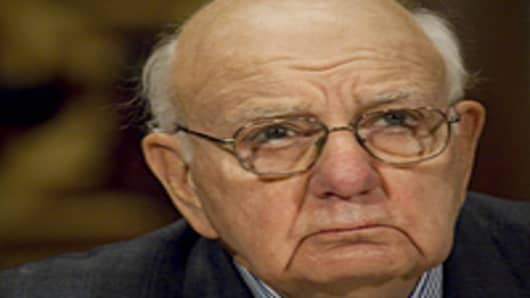Other provisions in contention include whom to exempt from new regulations governing the market for over-the-counter derivatives and how to dissolve financial companies before they pose systemic risk to the economy.
The White House renewed its support for a ban on banks that take deposits from making market bets with their own money — a practice known as proprietary trading. When Mr. Obama announced his support for that ban last month, he called it the “Volcker rule,” in honor of Paul A. Volcker, the former Federal Reserve chairman, who has championed the idea.
“We’re as committed to that now as we were on that day,” the White House press secretary, Robert Gibbs, said on Tuesday. “We’re not walking away from what the president outlined on the Volcker rule.”
But others involved said it might be difficult to persuade the Senate to go along. In December, the House adopted a plan with a provision to let federal regulators curb proprietary trading if they deem it too risky for banks.
Representative Paul E. Kanjorski, Democrat of Pennsylvania, who wrote that provision, said in an interview that “the Volcker rule grows out of my amendment,” and that they shared an aim: “We’re trying to re-establish credibility in the marketplace for financial institutions. They have, through this crisis, rightly or wrongly so, gained a dangerous reputation.”
But Mr. Kanjorski acknowledged that it had been tough to push his amendment through the House, and said that the Volcker rule went even further, because it gave less discretion to regulators.
W. Michael Blumenthal was one of five former Treasury secretaries who signed a letter this week endorsing the Volcker rule. “For any reform to be effective, it is important that we go back to separating, in some function or other, the normal banking activities of commercial banks from the trading activities,” he said in an interview. “The mixing of those two has gotten us into trouble, and it’s important to fix it.”
A spokesman for Senator Richard C. Shelby of Alabama, the ranking Republican on the Banking Committee, said that while Mr. Shelby “supports the spirit of the Volcker rule,” he was “not convinced that the proposal itself is necessary.”
The spokesman, Jonathan Graffeo, added: “Senator Shelby did not receive clear answers during recent hearings as to how proprietary trading contributed to the financial crisis, or why new authority is necessary given authority that bank regulators already have.”
Similarly, the proposal for a consumer financial protection agency — which would regulate mortgages, credit cards, home equity and auto loans and even pawn shops and which was part of the House bill — also seemed to face a tough road ahead.
Critics of the plan argue that it would interfere with “prudential regulation,” the rules set up to preserve the safety and soundness of financial institutions.
Michael S. Barr, the assistant Treasury secretary for financial institutions, tried to allay those concerns on Tuesday.
“Safety-and-soundness regulators have their eyes trained on risks to banks, not risks to consumers,” he told the Credit Union National Association in a speech at the Washington Convention Center, adding that the new agency would strengthen the banking system.
The United States Chamber of Commerce says it supports disclosures to consumers about the risks of financial products and opposes fraudulent and predatory practices. But the chamber argues that a new agency would choke off credit to small businesses, limit consumer choices and lead to higher prices.
Even supporters of the proposal said the opposition was daunting.
“We have supported an independent rule-writing agency, and to have the new agency focus on the nonbank sector for enforcement but have rules that apply across the board,” said Sheila C. Bair, chairwoman of the Federal Deposit Insurance Corporation. “What I am hearing at this point is that they have a steep climb.”
Ms. Bair, a Republican who was appointed by President George W. Bush, added: “I think that for bipartisan consensus, housing that in a separate agency is not going to happen.”
In asking industry leaders to come to the Treasury on Thursday, Mr. Geithner hopes to underscore the administration’s commitment to passing legislation this year, officials said.
As word of the meeting became public, several of those invited to the Treasury said they were not holding up the legislation.
“One of our key messages will be that markets crave certainty,” said Robert S. Nichols, president of the Financial Services Forum, which comprises chief executives of 18 of the largest financial institutions. “I don’t think the markets would respond well to a third year of debate over regulatory modernization.”
Monitoring systemic risk and arranging for a “resolution authority” to dissolve failing companies “in a nonchaotic way” were priorities for the executives, he said.
Kenneth E. Bentsen Jr., executive vice president of the Securities Industry and Financial Markets Association, said, “Our view very much is that the nation is better off with this happening than not.”


